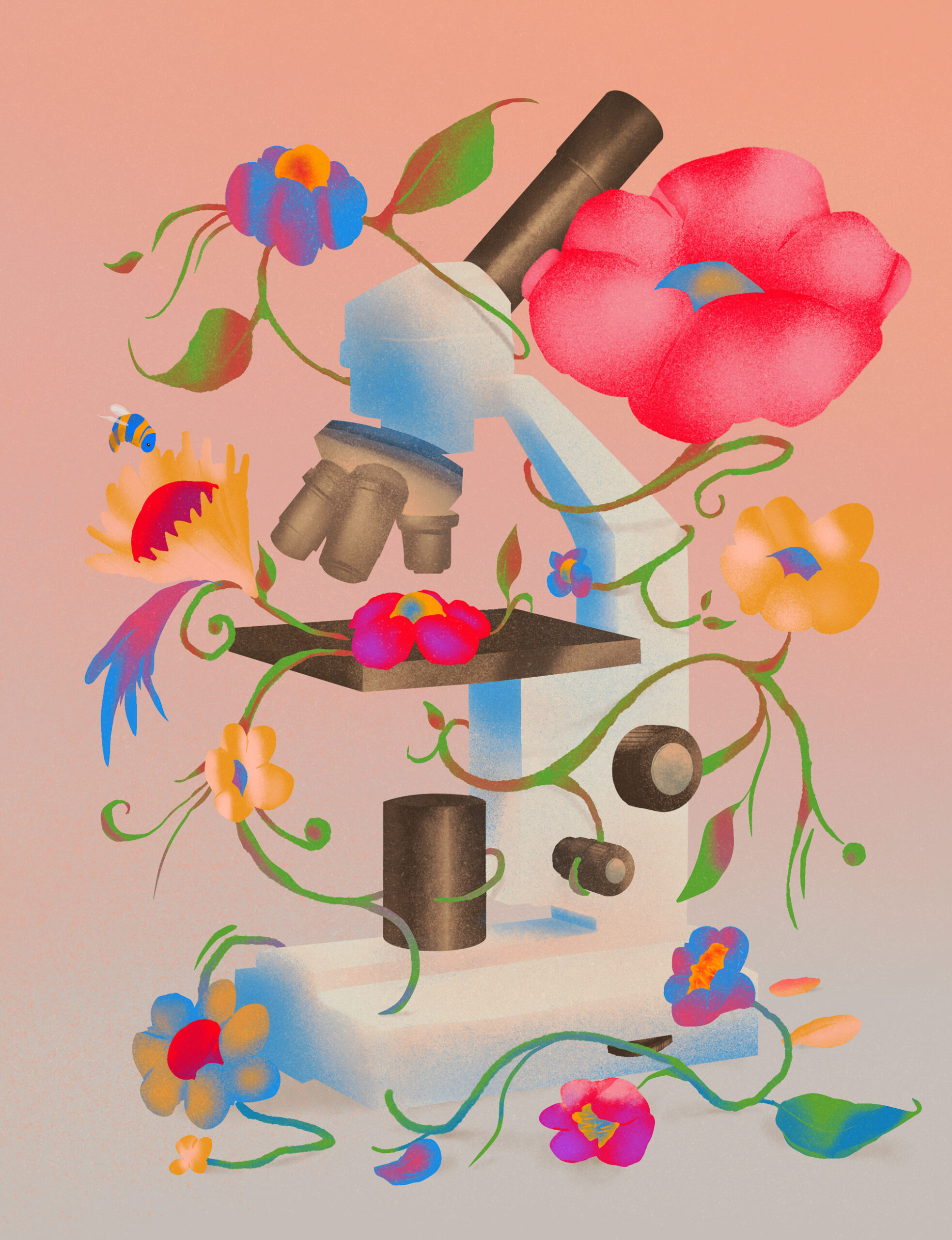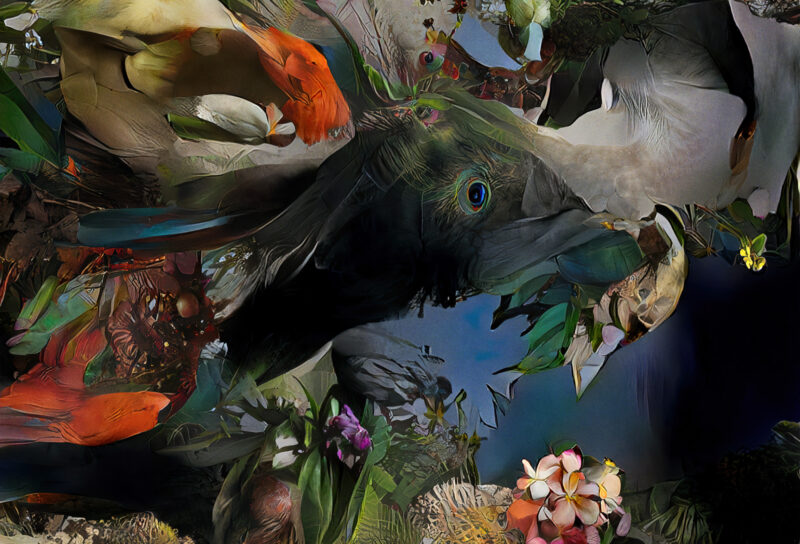The future isn’t just something that happens to us; it is determined by our choices. The question is always: who gets to decide? As we forge the future of synthetic biology, it is crucial that all who are involved in its co-creation can also have a say in its overall direction. And that this draws on a multiplicity of voices—with the greatest possible variety of lived experiences and social backgrounds. To that end, this year, Grow asked a select group of young synthetic biologists and industry veterans to share their unique perspectives on how the field will develop in the future. We wanted to include the voices of those who are not always empowered to define the futures of synthetic biology, to hear from more than just the usual handful of renowned names in the field. Answering three questions, these practitioners, educators, students, artists, ethicists, entrepreneurs, and activists tell all: their perception of the state of the science today; their projection for the future of the field; and their pie-in-the-sky dream for a world grown with synthetic biology.
What comes to mind when you think of the current state of synthetic biology?
Defining equity for itself: The big question for synthetic biology today is who gets a say in deciding the kind of futures we want to build? And how will that shape our understanding of the field? How do we select what ideas will get cemented over others? Who will have physical and intellectual access to the things we create?
–Aishani Aatresh, Undergraduate Student at Harvard University
Secret power: Synthetic biology is no longer an emergent technology. It has left the lab and can now be found in the technologies and products we use every day. Most people have yet to register that transition, but the future of synthetic biology is now.
–Anab Jain, Founder of Superflux
Not a panacea: It’s very easy to fall into the “technology will save us” trap, especially with the expansive power of biology as a resource. But on its own, synthetic biology will not solve our broken systems or untenable consumption habits. It must be viewed as just one in a range of possible solutions to the climate emergency.
–Amy Congdon, Chief Design Officer at Biofabricate
The scaling challenge: I became interested in synthetic biology because it seemed like the most useful way we could use biology to repair the damage done to our planet and reimagine how we manufacture things. We are now figuring out whether our social technologies will scale with scientific advancements.
–Leon Elcock III, Researcher at Interius Biotherapeutics
A hopeful vision: We are still in the early stages of a long, possibly revolutionary transformation. The biological processes we are designing could eventually replace the materials that make our buildings; the dyes that make our clothes pop; the foods that delight our senses and fuel our cells.
–Christina Agapakis, Creative Director at Ginkgo Bioworks
At risk of streamlining the status quo:
I am worried that as the technologies of synthetic biology evolve, like so many technologies that came before, we are going to leave out large portions of the population who won’t be able to access them. Synthetic biology can make our lives better and easier and help reverse climate change, but the technology must first be accessible and affordable.
–Alex Pearlman, Bioethicist & Communications Director at Concentric by Ginkgo
In creative flux: I used to think of synthetic biology as a terrain ruled solely by industry and capital. Thanks to Black feminist scholars like Sylvia Wynter, Alexis Pauline Gumbs, and Zakiyyah Iman Jackson, I now imagine the author, artist, teacher, and community organizer as biocultural actors actively shaping our visions of the future.
–Ayana Zaire Cotton, Artist and Cultural Worker
Not as democratic as I’d hoped: Synthetic biology once seemed like it would be able to bridge the world of people domesticating microbes in their homes for food and agriculture to the high-tech world of industries that are shaping the future. I have this conception of what synthetic biology can do, but that doesn’t really seem like the types of technologies that we’re seeing emerge.
–Daniel Chan, President of Biotech Without Borders
Disrupting industries: Synthetic biology has already disrupted the food and fashion industries. I hope pharmacology will be next, so that we can support localized healthcare with farm-to-table medicine.
–Tina Shing Li Lai, Leader of Open Plant NYC
Swayed by the market: I’m quite worried that synthetic biology, a practice that could transcend the limits of capitalism and its extractive paradigms, is instead in danger of being distorted by capitalism into yet another system of exploitation. Many of the issues of biotechnology boil down to scale, and the scale that contemporary industry demands is ecologically problematic.
–Andrea Ling, PhD Candidate at ETH Zurich
An incomplete loop: We talk a lot about synthetic biology as a solve-all, amazing, magic power, which I think it can be. But we don’t often talk about the full circle of what that means, or what inputs we’re starting with (like sucrose or carbon). We only talk about the outputs, like solving petroleum alternatives. We need to talk about the whole loop.
–Torrey Sirdevan, Founder of Better Earth Bio
What development will be most influential in determining the future course of synthetic biology?
Affordable drugs: To me, the most impactful way to use synthetic biology would be to make safe, open-source insulin that we could continuously produce and distribute at community centers, at no or very low cost. That would open the door to other affordable drugs.
–Alex Pearlman, Bioethicist & Communications Director at Concentric by Ginkgo
Community labs: The tools of large industry have created significant benefits, but in my imagination, an alternative system is needed: small labs that grow things specifically for and with local communities, thus creating strong bonds and new trust.
–Daniel Chan, President of Biotech Without Borders
Genetic sequencing: I believe that in just a few years, genetic medicine will be combined with practically every other type of medical intervention. On the non-medical side, the explosive growth of genetic datasets combined with AI-based interpretation methods will help us understand pathways and regulatory mechanisms in non-human organisms.
–Rachel Hovde, Engineer at Invitae
Microbial carbon sinks: The engineering of microbes that can feed off waste streams, such as carbon emissions, instead of sugars, could change the game. We must begin to see waste as a resource rather than a problem.
–Amy Congdon, Chief Design Officer at Biofabricate
New economic models: Eventually, we need to design mechanisms that enable communities to directly benefit from biology. That will allow us to transition away from the extractive relationships that currently exist within our economy and our society.
–Leon Elcock III, Researcher at Interius Biotherapeutics
Climate change: Extreme weather events and their vast rippling effects will steer the direction of synthetic biology.
–Anab Jain, Founder of Superflux
New coalitions: One convergence that will be most influential in shaping the future of synthetic biology is when abolitionists and scientists begin to co-conspire at scale, with a shared culture of care.
–Ayana Zaire Cotton, Artist and Cultural Worker
More bioengineers: We don’t have enough biomanufacturing capacity or bioengineers around the world right now to design and produce biological interventions on the timeline that we need. Expanding the commons of biotechnological production capacity will be critical to accelerating our transition to a sustainable civilization.
–Isaac Larkin, Postdoctoral Scientist at Abbott Labs
A new carbon cycle: I’m inspired by a scaled vision of circularity where we power biology with carbon emissions rather than biomass. This would allow us to clean up the environment while growing useful ingredients for food, materials and beyond. The future won’t be about copying nature, it will be about discovering a new nature. Designed and engineered by us, we will leave the destructive exploitation of the natural world behind to embrace a regenerative, abundant, healthier future on Earth.
–Suzanne Lee, CEO & Founder of Biofabricate
Reciprocity: Honoring reciprocity, even at the molecular level, deepens our awareness of ourselves and our relationships with other living beings, human and non-human, both within and beyond the lab. The future success of synthetic biology depends on the ability of science to flourish alongside all species—a technology designed with and for nature.
–Taylor Rayne, Undergraduate Student at Quest University
What would you grow if you could grow anything at all?
Displaced ecosystems: My dream is to dismantle industrialized agriculture and restore those billions of hectares to the natural biodiverse ecosystems that once existed in its place. I want to grow native species in abundance—what was once there and should be there now.
–Torrey Sirdevan, Founder of Better Earth Bio
New safety models: I would like to have a selection of different organoids that perfectly recapitulate the global diversity of human metabolisms and can be used to validate the safety of compounds.
–Daniel Chan, President of Biotech Without Borders
Fast plants: I want to grow a fast-growing plant or plankton that can quickly sequester vast amounts of carbon.
–Rachel Hovde, Engineer at Invitae
What nature produces already: I actually think we should stop thinking about what we as humans could grow, have more humility, and look at what nature already produces.
–Amy Congdon, Chief Design Officer at Biofabricate
Electric trees: I think many global problems are really just energy problems. There’s a lot of sunlight that we aren’t capturing, and if trees could convert that to usable energy we would make huge strides towards solving the energy crisis.
–Chris Kenyon, PhD Student at Northeastern University
Togetherness: I would grow a cultural craving for interspecies belonging and fellowship.
–Ayana Zaire Cotton, Artist and Cultural Worker
Biosensors: I would love to grow genetically modified plants that can record data from the environment. They would be invaluable allies in our efforts to understand climate change.
–Monika Seyfried, Interaction Designer
Affordable housing: I think we need to grow some affordable housing—growing both the components for their construction as well as the political will to use them equitably.
–Leon Elcock III, Researcher at Interius Biotherapeutics
Biodegradable kitchenware: I would engineer a plant that grows cups. Instead of disposable cups, we would have plant-grown cups that could be quickly composted after your morning coffee.
–Tina Shing Li Lai, Leader of Open Plant NYC
Anti-allergenic trees: I suffer quite terribly from hay fever. Pollen-free trees would be helpful to me, but I know pollen is important for other species, so perhaps there’s a way we can use synthetic biology to grow pollenous plants that don’t trigger allergic reactions.
–Anab Jain, Founder of Superflux
Carbon sequestering building materials: I’m actually already trying to grow these things. Construction and building operations are responsible for over 35% of global CO2 emissions. I’m doing my PhD on cyanobacteria biocementation and trying to create building materials that store CO2.
–Andrea Ling, PhD Candidate at ETH Zurich
A whole new world: A global biological system of inputs and outputs, providing clean air and restored ecosystems, accessible to all. Oh, and can I have my own pet dinosaur?
–Suzanne Lee, CEO & Founder of Biofabricate



